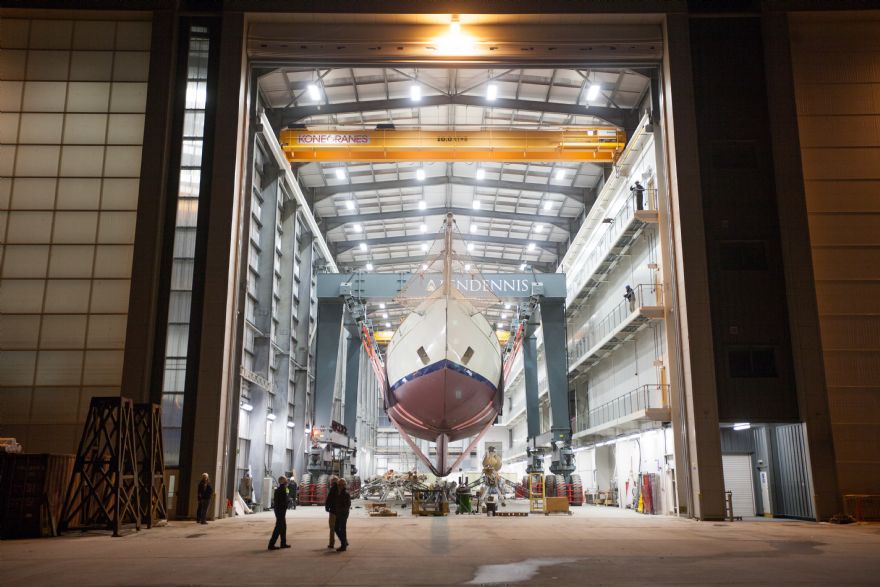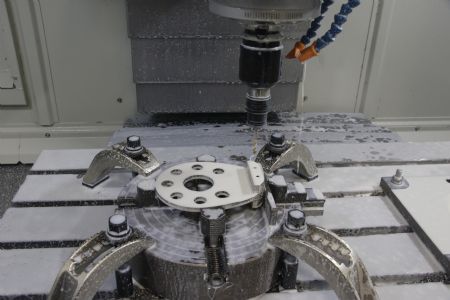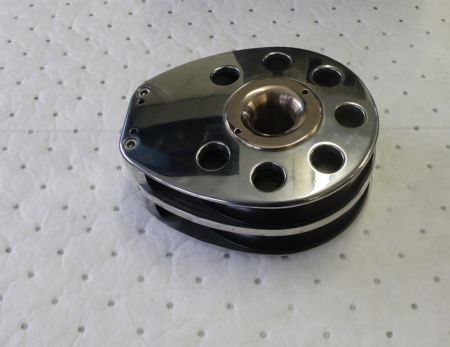 Photo: Pendennis
Photo: PendennisFor almost 40 years,
wPendennis Shipyard has been building, refitting and restoring fully custom superyachts on a waterfront site in Falmouth, Cornwall, and currently employs over 550 people covering a wide range of trades including machining, fabrication, electrical and joinery. The 14-acre site includes a 150m dry dock that can be split into two dry docks, two 90m construction halls, an enclosed non-tidal wet basin, along with an 800-tonne travel hoist to transport these luxury yachts between the facilities.
Pendennis houses all its machining capability in one building, named the Digital Manufacturing Centre (DMC), which can machine a variety of components, from 2mm-diameter pins to features on an 8m-long boom. Jack Chuter, Pendennis’s workshop manager, can now machine replacement parts for vessels, which accounts for 60% of the throughput in the DMC; he also liaises with surveyors and designers at the yard regarding new parts, which now account for the remaining 40% of the DMC’s machining work.
Improving efficiencyFor several years, the workshop had only manual machines, but Mr Chuter soon realised that CNC machines would not only improve efficiency but also the quality of the parts they were asked to manufacture, and in 2015 the company bought its first XYZ machine — an SMX 4000 bed mill from Devon-based
XYZ Machine Tools Ltd.
Mr Chuter said: “We didn’t want to jump straight into full-on CNC machining at this point, so the SMX 4000 with its conversational programming was a good place to start developing the workshop. Our machinists immediately reaped the benefits of the new machine, as it opened the scope of the parts that could be produced — in a reduced timeframe and with greater accuracy than on our manual equipment. A year later, and to complement this mill, we bought a large-swing gap-bed ProTurn SLX 555 x 1m CNC.”

Having decided to establish the DMC, the refit demand for the superyacht fleet showed no signs of slowing down, and the company made further investments in machinery to increase its in-house capability and accommodate increased throughput — namely an XYZ 1100 HD vertical machining centre and the XYZ TC 400 slant-bed turning centre.
“The benefits these give include reduced time frame to produce parts, as well as the ability to machine tougher materials that can withstand ‘the rigors of the open seas’. With the materials we work with covering everything from aluminium and phosphor bronze through to 316 stainless, 17-4 duplex, and Nitronic 50 and 60, and the machinery we now have tackles all these materials with ease. Moreover, we can now leave these machines to run unattended during production.”
The XYZ 1100HD has a work envelope of 1,100 x 610 x 610mm, which is ideal for tackling the tough, sea-resistant parts and materials Pendennis processes. The machine also features hardened box-section slideways, and a 28kW 10,000rev/min BT40 spindle. Meanwhile, the XYZ TC400 provides a maximum turning diameter of 400mm, a maximum turning length of 600mm, a bar capacity of 78mm, a 32kW 3,300rev/min spindle, and hardened box section slideways. The machine is already proving its worth turning one-offs and larger batch sizes.
The DMC employs three fully skilled machinists and two (soon to be three) apprentices who will benefit from the award-winning apprenticeship scheme at Pendennis. Mr Chute added: “We have a great blend of machines now. Having the manual lathes from XYZ is useful to us for very simple diameter work, but also allow us to get the apprentices started on their machining journey in year one.
One-offs and more-simple partsThe ProtoTrak-controlled machines have their place in the manufacturing centre to produce one-offs and more-simple parts. We get the apprentices onto these machines in year two so that they gain experience in using CNC equipment.

Mr Chute explained: “For the more-complex parts and higher volumes, the Siemens controlled 1100HD and TC 400 have been a great addition. We use a mix of CAD/CAM and shopfloor programming: the mills are 90% programmed via CAM, but all the turning work is programmed using the ProtoTrak and Siemens’s Shopturn conversational software.
“These latest investments in the XYZ machines — alongside a CNC water-jet machine and a five-axis CNC router has not only increased and improved the in-house capability of the Pendennis workshop but also increased the appeal of working at this prestigious shipyard. With just under a third of the workforce having completed an apprenticeship at Pendennis, growing our own talent is proving to be an integral part of the success of the shipyard; and having the latest generation of XYZ machines available to work on increases the appeal to young people of working at the shipyard.”
He concluded: “The experience of working at Pendennis is different to working in a ‘normal’ machine shop, and part of the team that is refitting a superyacht gives the whole workshop a sense of achievement.”